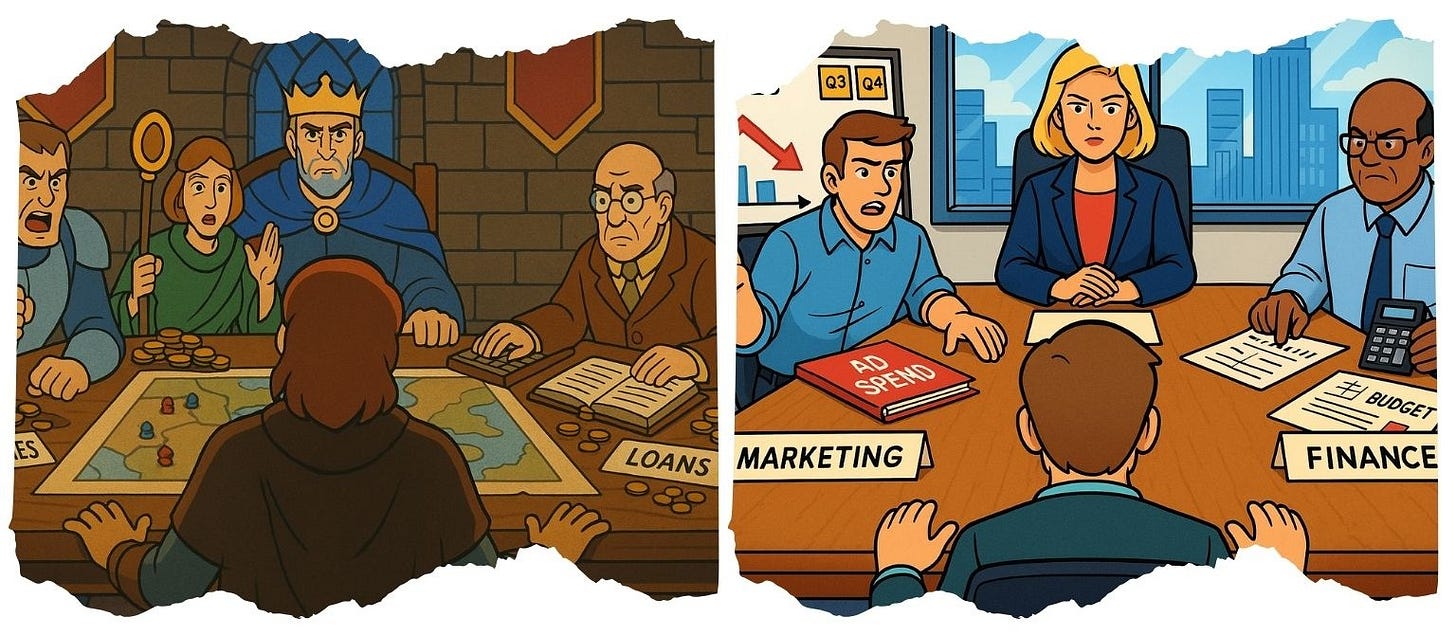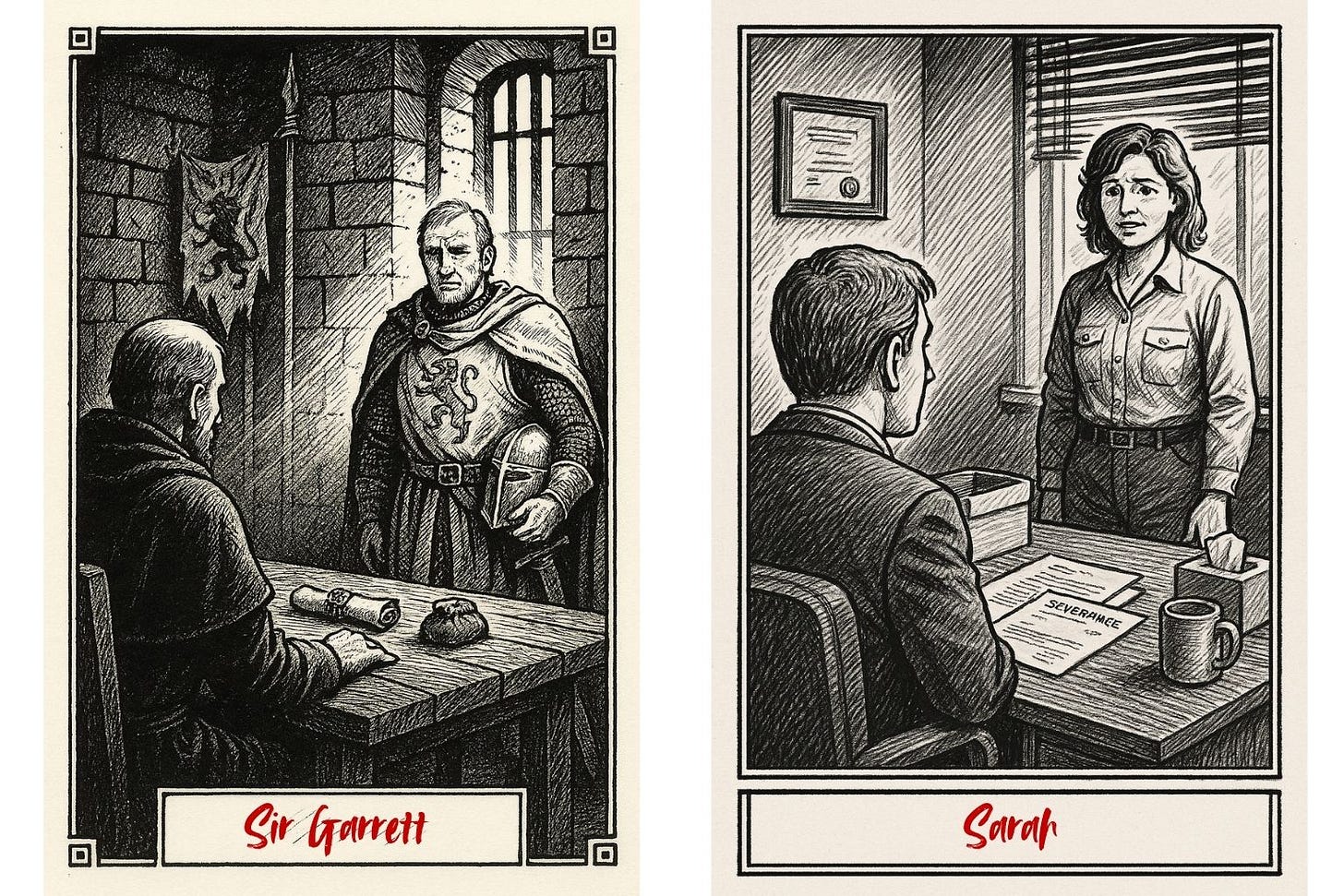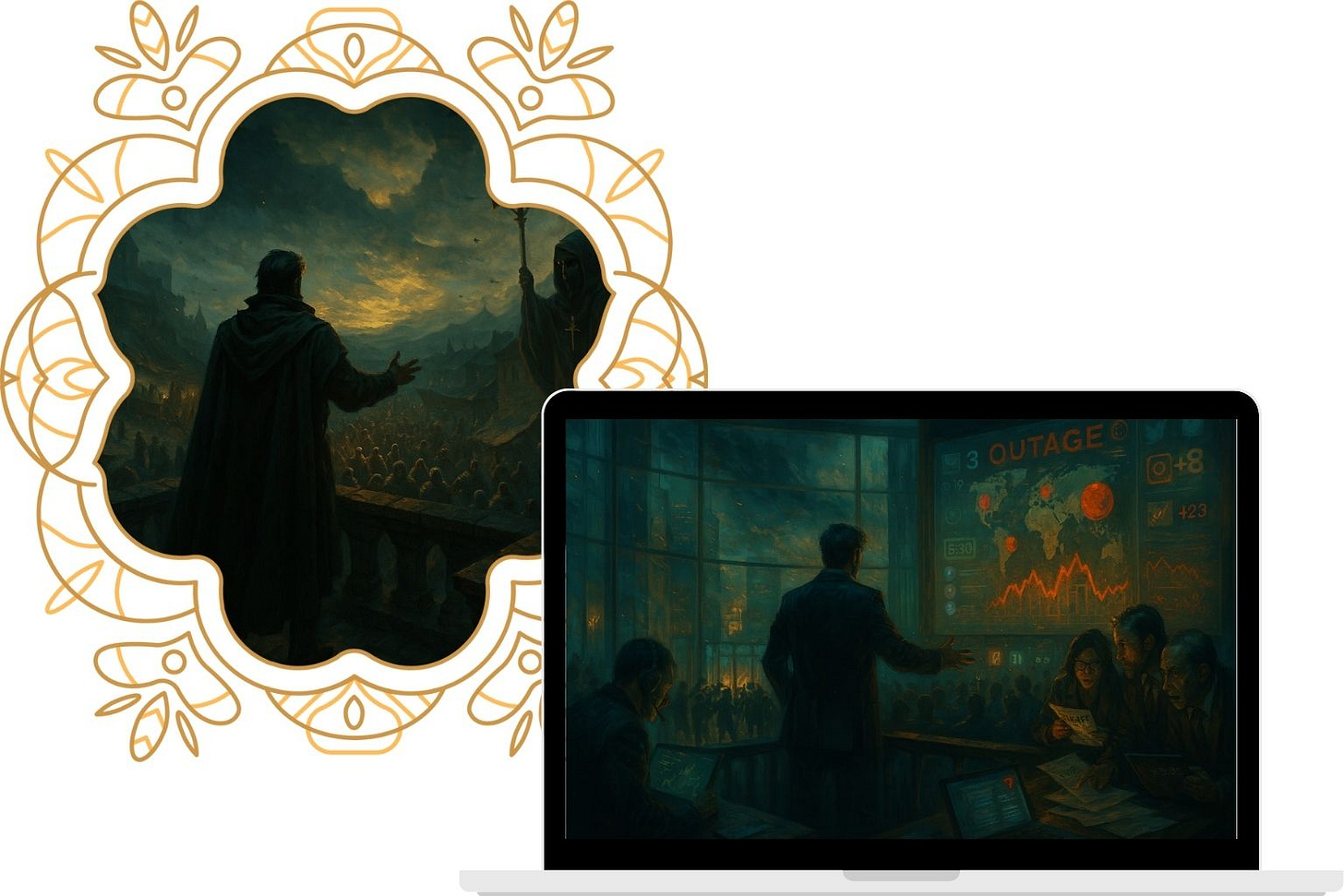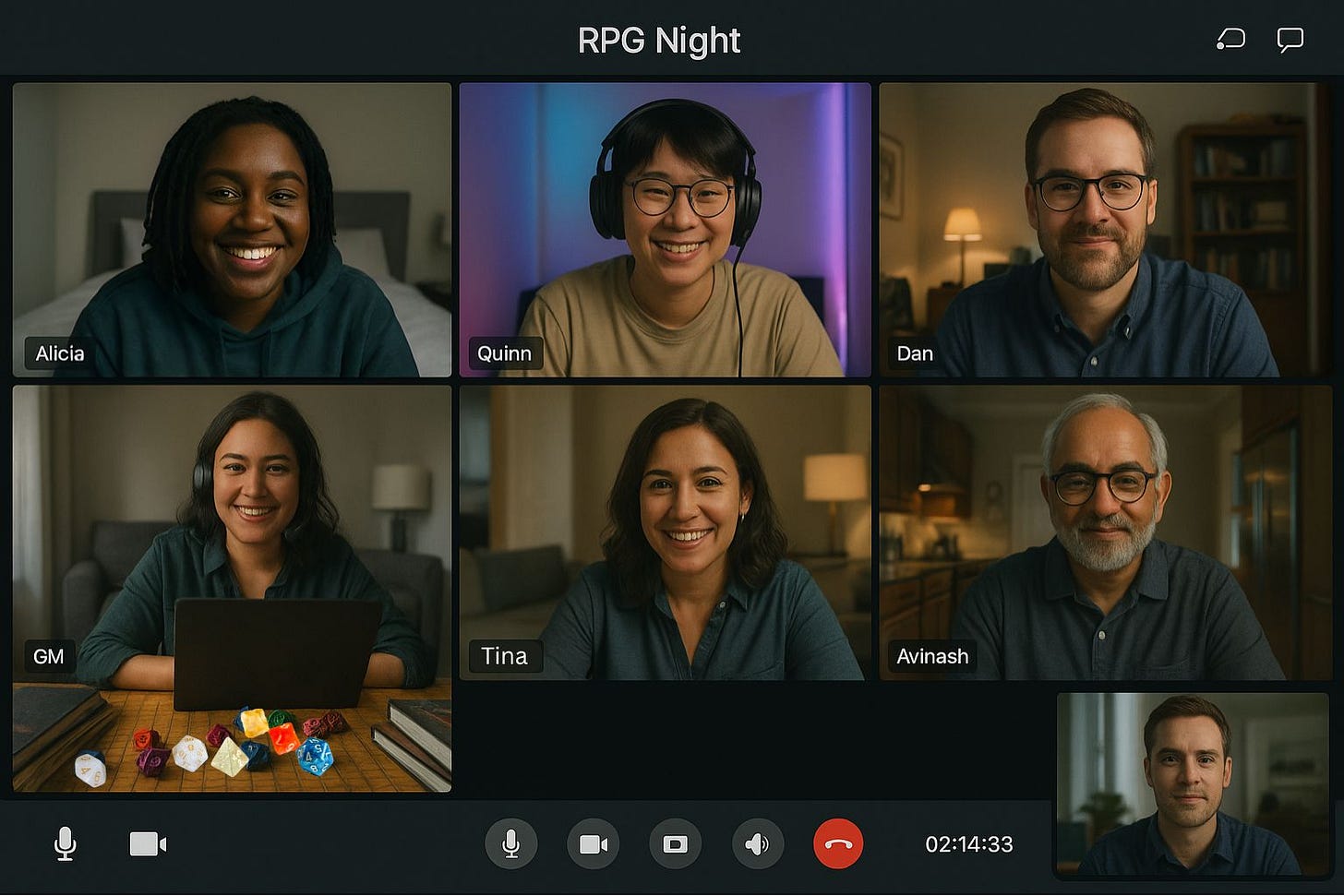The Dungeon Master's Guide to Better Business Training
Why Your Next Team Training Should Include Dragons, Dice, and Difficult Conversations
You find yourselves in the grand hall of Baroness Veyra, a powerful noble who controls the trade routes through this region. She sits upon a high-backed oak chair, draped in furs, her hawk-eyed gaze fixed on you. You’ve come to secure her support for your expedition: whether in the form of gold, supplies, or safe passage through her lands. Your task is to win her trust, uncover what matters most to her, and persuade her that helping you is worth the risk. You’ve been warned that she is cautious, skeptical, and not easily swayed. Many adventurers have come before, promising glory and riches, but few have delivered. She’ll raise concerns about cost, loyalty, and whether this quest benefits her people at all.
When you’re ready, Adventurer, step forward and introduce yourself to the Baroness.
No, that's not a scene from my monthly Dungeons & Dragons game, but its easy to understand why you might think so. It's actually a reskinned version of a classing business exercise: roleplaying a difficult client so that a salesperson has some practice before they encounter the real thing.
Don’t see it? Let's run it back, but without the fantasy overlay.
Alright, let’s step into this scenario. Imagine you’re at the start of a sales meeting. The salesperson is here to introduce their company’s service to a prospective client. The client, however, is not an easy win. They’re skeptical about whether this product is worth the investment, and they’ve had mixed experiences with vendors in the past. Salesperson, your job is to open the conversation, ask smart questions, and really listen to uncover what the client actually needs. Then, show how your product or service addresses those needs. Remember: you’re not just pitching features, you’re solving problems. I’ll play the Client, my role is to be cautious and doubtful. I won’t make it easy. I’ll raise objections like cost, timing, or whether this is even a priority right now.
When you’re ready, let’s begin. Salesperson, start us off as if you’re walking into the meeting and introducing yourself.
Until very recently, I wouldn’t have been caught dead talking about Role Playing Games in at work, even though role play has had a long history in workforce training, because “role playing” was a nerd thing (or misunderstood - intentionally or not - as only sexual roleplaying). For years, that kind talk was something to hold back until you really knew those you worked with a lot better, even though there is a long tradition of using role play to provide communication and decision-making experience for members of the workforce. In the last couple of decades since I entered the workforce, we’ve seen a complete change in the acceptance of “nerd culture;” Game of Thrones brought the fantasy genre to the masses, Marvel took over nearly all media, and, in general, RPGs have just has the time to slowly seep into modern culture. I’m fairly certain that I know know more Directors, VPs, and executives that have played RPGs or are open to them than not. A lot of people have stopped pretending that there is something intrinsically different between pretending your a fantasy wizard and the pretend involved in a mock interview.
In this new golden age of nerd-dom, I wonder if there is a new space to call a spade a spade and embrace role playing games more completely as a tool for teaching communication, leadership, and business strategy.
Leveling Up: Why Roleplay Works
Here's what happens when you sit through another "communication skills" workshop: You nod along while someone explains active listening. You watch a polished video of actors having the perfect difficult conversation. You fill out a workbook. Then you go back to your desk and have the exact same unproductive meeting you had last week.
The problem isn't your attention span or your team's stubbornness. It's that your brain doesn't learn complex interpersonal skills by being told about them. You learn by trying them, messing up, figuring out what went wrong, and trying again. Roleplay gives you a place to mess up safely.
Think about it: when do you actually get better at difficult conversations? Not during the monthly training session, but during the actual difficult conversation. But by then, the stakes are real. Your relationship with your coworker is on the line, or your client is already frustrated, or your boss is questioning your judgment. Roleplay lets you compress time and practice the hard stuff without the real-world consequences.
The fantasy element isn't just window dressing. When Sarah from Accounting plays a starship captain, she's not worried about what her actual manager thinks of her negotiation style. She's not performing for her peers or protecting her professional reputation. She can experiment with being more assertive, or more collaborative, or more curious. The dragon doesn't know she's usually terrible at asking follow-up questions.
This isn't just theory. Watch someone practice the same scenario twice: once as themselves dealing with a difficult stakeholder, and once as an adventurer convincing a suspicious village elder. They'll almost always perform differently in the fantasy version. Usually better. The artificial distance gives them permission to be more creative, take bigger risks, and actually engage with the problem rather than managing everyone's perception of their performance.
Doppelgangers: Business Problems in Disguise
The art is in keeping the business logic identical while changing everything else. The starship captain dealing with supply shortages faces the exact same challenges as the operations manager trying to stretch the Q4 budget. The village council trying to decide whether to trust the mysterious strangers mirrors the executive team evaluating a partnership with an unproven startup. The fantasy wrapper isn't a distraction from serious business learning. It's what makes serious business learning possible by creating the psychological safety and creative freedom that adults need to actually grow and change.
Here's how to think about it:
Budget negotiations become resource allocation for an expedition. The adventuring party has limited gold and needs to decide between better weapons, more supplies, or hiring a guide. The dynamics are identical: competing priorities, risk assessment, and the tension between immediate needs and long-term planning.
Performance reviews become knighthood evaluations. Sir Marcus has been brave in battle but struggles with following orders. The conversation about improvement areas, goal-setting, and career development stays the same. The medieval setting just makes it easier to separate the feedback from personal identity.
Crisis management becomes defending against dragon attacks. The town is under threat, information is incomplete, resources are stretched, and everyone's looking to you for answers. Whether it's a server outage or a literal dragon, the leadership challenges are identical.
Stakeholder alignment becomes forming alliances between kingdoms. Each faction has their own interests, their own constraints, and their own definition of success. The negotiation skills needed to get everyone pointed in the same direction don't change just because you're talking about trade routes instead of quarterly targets.
The trick is avoiding lazy stereotypes. Not every medieval setting needs to default to "women can't be knights" or "all nobles are evil." Not every space scenario needs to be militaristic. Build rich, interesting contexts that respect the complexity of real workplace dynamics.
Example: The Budget Crisis
Fantasy Version: The royal treasury is nearly empty. War with the neighboring kingdom looms, but the harvest failed and taxes are already crushing the peasantry. You sit at the war council table as the king's advisors argue: General Thorne demands funds for mercenaries, Healer Marin insists the plague-stricken villages need medicine, and Treasurer Aldric warns that borrowing more gold will bankrupt the realm. As the king's most trusted counselor, all eyes turn to you. "Choose wisely," the king says grimly. "We cannot afford all three."
Business Version: The department is 40% over budget with two months left in the fiscal year. Competition is heating up, but the product launch was delayed and sales are down. You're in the leadership meeting as everyone argues: Marketing wants more ad spend, Engineering says they need contractors to fix critical bugs, and Finance warns that exceeding budget will kill next year's headcount. As the department head, your CEO looks at you expectantly. "Make the call," she says. "We can't fund everything."
Example: The Layoff Conversation
Fantasy Version: You must deliver devastating news to Sir Garrett, a loyal knight who has served your house faithfully for twelve years. The war is ending, funds are scarce, and you can no longer afford to maintain the full garrison. "My lord," he says, noticing your grave expression, "you summoned me?" His weathered face shows concern but trust. This conversation will end his livelihood and force him to leave the only home he's known. He has a wife and two young children. How do you honor his service while delivering news that will upend his life?
Business Version: You have to let Sarah go. She's been with the company for twelve years, consistently reliable, well-liked by everyone. The funding round fell through and you have to cut 30% of staff. "Hey boss," she says, settling into the chair across from your desk with her usual smile, "what did you want to talk about?" She has no idea what's coming. She just bought a house. Her daughter starts college next year. How do you deliver this news with dignity while being clear about what's happening?
Example: The Crisis Communication
Fantasy Version: The message arrives at dawn: plague has broken out in three villages simultaneously. Panic spreads faster than the disease itself. Merchants are abandoning trade routes, neighboring lords are closing their borders, and desperate families are fleeing toward your city walls. Your advisors crowd around you with conflicting information—some claim it's divine punishment, others blame contaminated grain shipments, and the court physician admits he's never seen symptoms like these. The people look to you for answers you don't have and leadership in a situation that changes by the hour. What do you tell them?
Business Version: The alert comes at 6 AM: your platform is down across three regions simultaneously. Social media explodes with angry customers. Partners are threatening to terminate contracts, the stock price drops 8%, and reporters are calling for comment. Your team crowds into the conference room with conflicting theories—maybe it's the server migration, possibly a DDoS attack, or perhaps that new code deployment. Your CTO admits they've never seen a failure pattern like this. The CEO wants a statement in two hours for the board meeting. What do you say when you don't know what's happening?
Chaotic vs Lawful: What The Mechanics Teach
This is where RPG thinking gets genuinely useful. Game mechanics make abstract concepts tangible in ways that spreadsheets can't. Here are some examples of how game mechanics can help express ideas.
Give people limited resource points to represent budget, time, or political capital. When the marketing team has exactly 10 tokens to distribute across four initiatives, they can't just say "we need more resources." They have to make trade-offs. They have to decide what gets cut. It forces the same hard conversations you need in real budget planning, but with poker chips instead of PowerPoint.
Use dice rolls for uncertainty. Not everything in business goes according to plan, and not every good strategy succeeds. When someone's brilliant plan depends on rolling a 7 or higher, they learn to build contingencies. They start thinking about what happens when the market shifts, or the vendor is late, or the key person quits.
Structure turn-taking to fix meeting dynamics. When only one person can speak at a time, and speaking order follows clear rules, you eliminate the usual problems: the loudest voice winning, the senior person dominating, the quiet experts never contributing. Everyone gets heard. Everyone has to listen.
Hide information to surface assumptions. When the marketing team can't see engineering's cards, and engineering can't see sales' cards, they have to actually talk to each other. They have to ask questions instead of assuming they know what everyone else is thinking.
These aren't gimmicks. They're ways of making invisible business dynamics visible and forcing people to practice the skills that actually matter. If you want to run a single session, pick mechanics that help you support that scenario, and if you’re doing something long-term and need to pick an RPG system, understand where its mechanics overlap well with the business concepts.
What RPG system should you use? Whatever is easiest for your players! That might mean rolling up D&D characters, or using something easier to learn. A setting neutral system such as Fate Accelerated Edition may work well, or to keep it simple, a one-page RPG like Lasers & Feelings (although that is a sci-fi game without a reskin).
If you have a recommendation, please leave a comment below!
Speaking of keeping your group comfortable…
Session Zero: Keeping It Safe & Professional
Yes, you absolutely need to think about safety when you're asking people to act out scenarios with their coworkers. Not because roleplay is inherently dangerous, but because vulnerability always requires care. While an RPG can help people relax and act more naturally, they may show sides of themselves they haven’t shown to coworkers before. Others with less role playing experience may not be comfortable “acting” or doing some of the other things that we might expect from someone who games regularly.
The basics are simple: No one gets forced into the spotlight if they're uncomfortable. No scenarios based on real workplace conflicts or real people. No personal attacks disguised as character choices. Anyone can pause or stop a scenario without having to justify why.
Keep it professional. This operates under the same workplace guidelines as any other business activity. The same harassment policies, the same accommodation requirements, the same respect for boundaries. The fantasy elements don't change the fundamental responsibility to maintain a professional environment.
Respect Confidences. What people share in roleplay scenarios stays in roleplay scenarios unless they explicitly agree otherwise or it violates an HR policy that requires reporting. Individual performance doesn't need to shared with managers or used in evaluations. The learning is for the participants and can remain confidential to the group.
Separate performance from identity. Make sure any feedback is about what the character did, not who the person is. "Kaldor’s question helped reveal their real concern," not "You're naturally empathetic." Focus on choices and behaviors, not personality traits.
Although I didn’t recommend specific RPGs, I do recommend that you use a framework to set ground rules, even for narrow scenarios to make sure players don’t touch on topics that would make others uncomfortable or require reporting. If you want to run something longer with coworkers, you’ll definitely want to look into established system for handling this such as X-Card or Lines & Veils.
Easy Skill Check
You don't need expensive platforms or elaborate preparations. Pick one business challenge your team faces regularly. Design both the business version and a fantasy equivalent. Gather three or four willing participants. Allocate an hour: quick setup, practice both versions, structured debrief.
Start with that Baroness scenario from the beginning. Run it as written, then immediately follow with its business equivalent, securing stakeholder support for a new initiative. The conversation afterward will reveal how much your team learns when the artificial barriers to honest practice get removed.
The tools are simple. The methods are proven. Worst case you might form some comradery with those you invited, but it might inspire them to think differently about work, too. The only question is whether you're ready to embrace the idea that the best business training might not look like business training at all.
Most of our professional challenges aren't technical problems. They're human problems. Communication, persuasion, collaboration, decision-making under uncertainty. There are a lot of great text books and frameworks out there for teaching those skills, but they don’t come alive without practice. A good role playing session is alive because of those skills: experimentation, trust in the other players, and the willingness to try something different and learn from what happens next.








